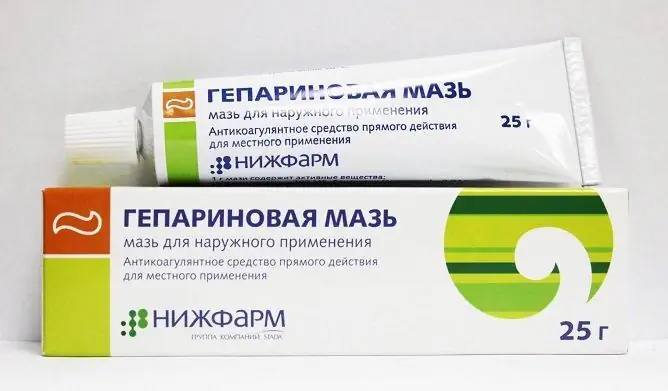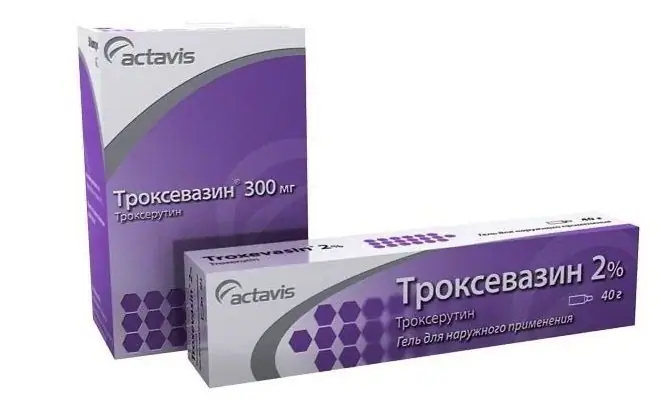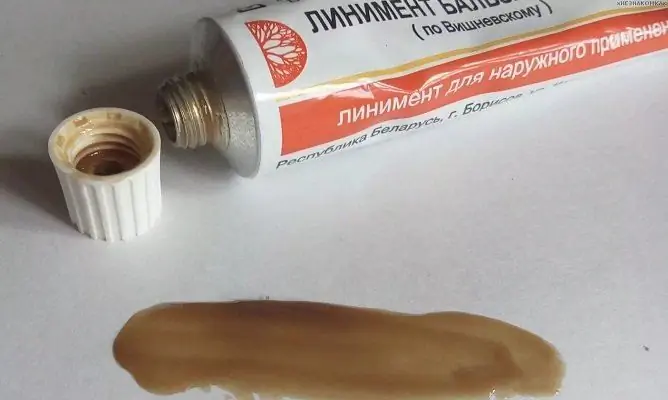- Author Rachel Wainwright wainwright@abchealthonline.com.
- Public 2023-12-15 07:39.
- Last modified 2025-11-02 20:14.
Immunovenin
Immunovenin: instructions for use and reviews
- 1. Release form and composition
- 2. Pharmacological properties
- 3. Indications for use
- 4. Contraindications
- 5. Method of application and dosage
- 6. Side effects
- 7. Overdose
- 8. Special instructions
- 9. Application during pregnancy and lactation
- 10. Use in childhood
- 11. In case of impaired renal function
- 12. Use in the elderly
- 13. Drug interactions
- 14. Analogs
- 15. Terms and conditions of storage
- 16. Terms of dispensing from pharmacies
- 17. Reviews
- 18. Price in pharmacies
Latin name: Immunovenin
ATX code: J06BA02
Active ingredient: Human normal immunoglobulin
Producer: NPO MICROGEN FGUP (Russia)
Description and photo update: 18.10.2018
Prices in pharmacies: from 3275 rubles.
Buy

Immunovenin is an immunobiological drug.
Release form and composition
Dosage form Immunovenin - lyophilisate for preparation of a solution for intravenous administration: porous hygroscopic mass of white color in the form of a tablet; ready-made solution - transparent colorless or slightly yellowish liquid, slight opalescence is possible [in bottles (vials) with a volume of 25 and 50 ml, complete with a solvent (water for injection) in bottles (vials) of 25 and 50 ml, in a cardboard box 1 set with blood transfusion system].
25 ml of the preparation contains:
- active substance: immunoglobulin G - 1.25 g;
- additional components: glycine, dextrose monohydrate, maltose monohydrate.
Pharmacological properties
Pharmacodynamics
Immunovenin is a purified fraction of immunoglobulins isolated by fractionation with ethyl alcohol from the blood plasma of healthy donors (no less than 1000) at temperatures below 0 ° C. All plasma used in production is individually tested for the absence of HIV-1 p24 antigen (human immunodeficiency virus), hepatitis C virus RNA and hepatitis B surface antigen (HBsAg), as well as the following antibodies: to the causative agent of syphilis, to hepatitis C virus, to the virus human immunodeficiency HIV-1 and HIV-2.
Immunovenin contains a wide range of specific antibodies against infectious agents capable of opsonization and neutralization of toxins and microbes. The drug replenishes the level of antibodies in the recipient's blood, restores the low level of immunoglobulin G to normal values. Also, the agent has nonspecific activity, manifested in an increase in the body's resistance.
Pharmacokinetics
Immediately after administration, the entire dose of Immunovenin enters the bloodstream directly. After about 6 days, an equilibrium of the distribution of immunoglobulin between the extra- and intravascular channels is achieved.
Indications for use
Complex therapy:
- postoperative complications accompanied by septicemia;
- severe toxic forms of viral and bacterial infections.
Substitution therapy:
- congenital HIV infection with recurrent infections in children;
- primary immunodeficiency (congenital hypogammaglobulinemia and agammaglobulinemia);
- secondary immunodeficiency in patients with multiple myeloma and chronic lymphocytic leukemia, accompanied by recurrent infections.
Contraindications
- a history of allergic reactions to blood products;
- hypersensitivity to the components of Immunovenin;
- hypersensitivity to human immunoglobulin, especially rare cases of antibodies against IgA and a deficiency in the blood of immunoglobulin class A (IgA).
In severe sepsis, the use of Immunovenin is contraindicated only in one case - a history of anaphylactic shock to blood products.
Carefully:
- age over 65;
- diabetes;
- hypertension;
- severe hypovolemia;
- impaired renal function;
- decreased volume of circulating blood;
- chronic diseases, accompanied by increased blood viscosity;
- hereditary and acquired thrombophilic disorders;
- vascular diseases and a history of thrombosis;
- prolonged immobilization;
- overweight;
- simultaneous use of drugs with nephrotic action.
Patients who are at risk of developing thromboembolism or acute renal failure, Immunovenin should be administered at the lowest possible rate and at the lowest dose.
Patients with diseases in the genesis of which are leading immunopathological mechanisms (for example, nephritis, collagenosis or immune diseases of the blood), Immunovenin can be used only after consulting an appropriate specialist.
For persons prone to allergic reactions or having allergic diseases (recurrent urticaria, bronchial asthma or atopic dermatitis), the administration of Immunovenin is carried out under the guise of antihistamines, which continue to be administered for 3 days after the course of treatment. During the period of exacerbation of the allergic process, the use of Immunovenin is possible only for health reasons, according to the conclusion of the allergist.
There are suspicions about the relationship between intravenous administration of immunoglobulins and such phenomena of thromboembolism as pulmonary embolism, stroke, myocardial infarction, deep vein thrombosis, especially in risk groups.
Instructions for the use of Immunovenin: method and dosage
Immunovenin is administered intravenously as a drop infusion. Immediately before administration, the lyophilisate is dissolved in the solvent supplied in the kit.
A single dose for children is 0.15-0.2 g / kg (3-4 ml), but not more than 1.25 g (25 ml). Before the introduction, the solution prepared from the lyophilisate is additionally diluted with a solution of sodium chloride 0.9% in a ratio of 1: 4 (1 part of the drug, 4 parts of a solution of sodium chloride). The resulting solution is injected at a rate of 8-10 drops / minute. The course of treatment is 3-5 days.
A single dose for adults is 1.25-2.5 g (25-50 ml). The solution prepared from the lyophilisate (without additional dilution) is injected at a rate of 30-40 drops / minute. The interval between injections is 24-72 hours, the course of treatment is 3-10 infusions.
When carrying out replacement therapy in cases of primary immunodeficiency, patients are prescribed 0.4-0.8 g / kg (8-16 ml) once. Further, to maintain the IgG titer in plasma at a level of 4-6 g / l, the drug is administered at a dose of 0.2-0.8 g / kg (4-16 ml) every 2-4 weeks. To determine the optimal dose and the interval between infusions, it is necessary to monitor plasma IgG.
When carrying out substitution therapy in the case of secondary immunodeficiencies in patients with myeloma and chronic lymphocytic leukemia, accompanied by recurrent infections, as well as in substitution therapy in children with congenital HIV infection, accompanied by recurrent infections, Immunovenin is prescribed at a dose of 0.2-0.4 g / kg (4-8 ml). To maintain the titer of IgG in plasma at the level of 4-6 g / l, the drug is administered every 3-4 weeks. To determine the optimal dose and the interval between infusions, it is necessary to monitor plasma IgG.
Immunovenin is used only in a hospital setting in compliance with all aseptic rules. Before use, the vials are kept at a temperature of 18-22 ° С for at least 2 hours. The lyophilisate should dissolve completely within 10 minutes in the volume of the supplied solvent. The prepared solution cannot be stored. The preparation and solvent are not suitable for use if their color, transparency of the solvent has changed, if the integrity or labeling of the package is violated, in case of improper storage or expiration date.
Side effects
- on the part of the cardiovascular system: lowering blood pressure; in rare cases, collapse;
- from the gastrointestinal tract: nausea, vomiting;
- others: flu-like syndrome (headache, chills, hyperthermia).
In isolated cases, acute renal failure, hypercreatinemia, transient hemolytic anemia, reversible aseptic meningitis, hemolysis occur.
There is evidence that high doses of intravenous immunoglobulins lead to a relative increase in blood viscosity, and therefore it is assumed that there is a relationship between the administration of intravenous immunoglobulins and such phenomena of thromboembolism as pulmonary embolism, stroke, myocardial infarction, deep vein thrombosis, especially in risk groups.
In patients with altered reactivity, allergic reactions of various types may develop, in exceptional cases - anaphylactic shock. For this reason, the administration of the drug should be carried out in a room where anti-shock therapy is available, and patients should be under medical supervision within an hour after the administration of Immunovenin.
Overdose
In patients with impaired renal function and in patients at risk, an increase in blood viscosity and the development of hypervolemia are possible.
special instructions
Immunovenin does not contain preservatives or antibiotics.
During the administration of the drug, the patient must be under close medical supervision.
All persons receiving immunoglobulin should be adequately hydrated before starting the infusion, control urine output and plasma creatinine concentration, and exclude the use of loop diuretics during treatment.
Immunovenin can lead to false positive serological test results (for example, Coombs' test) and a transient increase in various passive transferred antibodies in the patient's blood.
The drug contains maltose and glucose. For this reason, an increase in the concentration of glucose in the blood is possible, as a result of which the result of the analysis for the content of glucose in the blood changes during the administration of Immunovenin and within 15 hours after the infusion. This fact should be taken into account when treating patients with diabetes mellitus.
The use of Immunovenin must be registered in the established accounting forms indicating the name, batch number and manufacturer, date of issue and expiration date, date of administration and adverse reactions that have occurred, if any.
Influence on the ability to drive vehicles and complex mechanisms
Immunovenin does not affect the ability to drive a car, work with complex mechanisms and perform potentially hazardous work that requires speed of reactions and increased attention.
Application during pregnancy and lactation
Controlled clinical trials on the safety of Immunovenin during pregnancy and lactation have not been conducted. However, according to the data of long-term clinical experience of intravenous use of immunoglobulins during pregnancy, one should not expect a negative effect of Immunovenin during pregnancy either in relation to a woman or in relation to a fetus / newborn.
Immunoglobulins are excreted in breast milk and can carry protective antibodies from mother to newborn. On the recommendation of the attending physician, the drug can be used during lactation.
Pediatric use
Immunovenin is used in pediatrics according to indications, in accordance with the age-related dosage regimen.
With impaired renal function
In case of impaired renal function, the drug should be used with caution.
In cases where there is a risk of developing acute renal failure, Immunovenin should be administered at the lowest possible dose and at the lowest possible rate.
Use in the elderly
In old age (over 65 years) Immunovenin should be used with caution.
Drug interactions
Immunovenin can be used in combination therapy in combination with other drugs. However, it must not be mixed with other drugs, and a separate infusion set must be used for administration.
Immunovenin can reduce the effectiveness of active immunization, and therefore live vaccines (against chickenpox, mumps, measles, rubella) should be administered no earlier than 3 months after the end of the course of immunoglobulin treatment.
Analogs
Immunovenin analogs are: Immunoglobulin, Biaven V. I., Intratect, Human normal immunoglobulin, Pentaglobin, Gabriglobin, Gamimun N, Prividzhen, Gamunex, Octagam, Intraglobin, Humaglobin, Sandoglobulin, I. G. Vein.
Terms and conditions of storage
Store and transport in accordance with Sanitary and Epidemiological Rules 3.3.2.1248-03 at a temperature of 2 to 8 ° C. Keep out of the reach of children.
The shelf life is 3 years.
Terms of dispensing from pharmacies
Dispensed by prescription.
Reviews about Immunovenin
Reviews about Immunovenin are positive. Patients note a significant improvement in immunity after a course of treatment, but they are unhappy that the drug is hard to find in the pharmacy network.
Price for Immunovenin in pharmacies
The price for Immunovenin is 2,700-2,800 rubles per 25 ml bottle.
Immunovenin: prices in online pharmacies
|
Drug name Price Pharmacy |
|
Immunovenin 50 mg / ml lyophilisate for preparing a solution for intravenous administration complete with a solvent 25 ml 1 pc. 3275 RUB Buy |

Maria Kulkes Medical journalist About the author
Education: First Moscow State Medical University named after I. M. Sechenov, specialty "General Medicine".
Information about the drug is generalized, provided for informational purposes only and does not replace the official instructions. Self-medication is hazardous to health!






